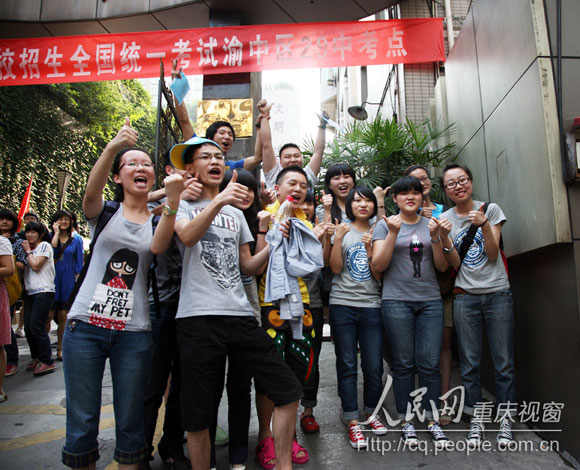National endurance exam
|
|
|
[By Wei Yidong/People.com.cn] |
You always know when the gaokao is looming even without looking at the calendar. Students are the barometer. They look paler, eyes are deeper set and their faces are more drawn, all tell tale signs that it must be near to the first Thursday in June. It can mean only one thing, National College Entrance Exam time for high school students and the relentless preparation regime has taken its toll.
This two day test is the benchmark that all students are measured against and goes a long way to determining not just their academic career but their professional one as well. The importance of the exam has been drummed into the students since they were small and they know the price of failure, the pressure is immense.
I once asked a student who was showing signs of fatigue how long they had been preparing for the exam, "twelve years" she replied without a hint of humor in her voice. I don't doubt she could see the irony of her comment just that she was too weary to elaborate. She was right though, the curriculum in middle and high school has all been geared to this moment, the National College Entrance Exam is an endurance event.
Their final mark will determine which university they go to and, within the current system at least, that is the one thing that makes sense. Universities need people who are good at passing tests, regurgitating facts from memory is key to this. Whether they are brilliant students, exceptional at applying these facts to problem solving or creative geniuses has nothing to do with it, if they cannot pass a test they will not enter a top university.
The roots of this type of testing stretches back into ancient times. When the keju, imperial civil service exam, was introduced around 600 AD it created the blueprint for all subsequent exams to follow. These aspiring bureaucrats were subjected to days of testing on anything from mathematics to sportsmanship.
When the gaokao was reinstated in 1977 there was never any doubt it would follow the same pattern. In that first exam just under 6 million students attempted to win one of 220,000 or so university places. The odds are better today but in many ways the outcome for the unsuccessful is worse than before. With an inevitable gap widening between the haves and the have nots due to market forces, the loss in prestige, position and earning potential can be immense.
Some believe it is an inflexible and ineffective system that puts children through too much pressure. From the outside looking in, it is easy to sympathize with this view but there are others who think, that although not perfect, it is the fairest system possible. By this they mean students stand and fall by their own merits, not by family connections.
Education, all around the world, can and does provide an escape from poverty. One of the fallouts from the global financial crisis has been the choking off of this lifeline with many countries, including the UK, raising university fees to such an extent that education becomes a route only for the wealthy. China is to be congratulated on this score and the reluctance for authorities to change the gaokao is understandable, but we can't help but coming back to the two flaws, one subjective one pragmatic, that mean change should come.
The distress this single exam causes children and their families is intolerable and it is not necessary in determining either a nationwide benchmark or an individual's suitability for further study. The level of a person's breaking point maybe subjective but it is obvious both of these criteria can be achieved by other, less pressurized means.
If the human element is not enough to bring about change, industry economics should eventually lead to an overhaul of this purely rote learning system. Memorizing facts is all well and good but in the real world, outside of the classroom, it is the ability to apply knowledge creatively that leads to an individual's and a society's advancement.
The author is a communications professional, film maker and published writer with a keen interest in life.
Opinion articles reflect the views of their authors, not necessarily those of China.org.cn.
 0
0 








Go to Forum >>0 Comments